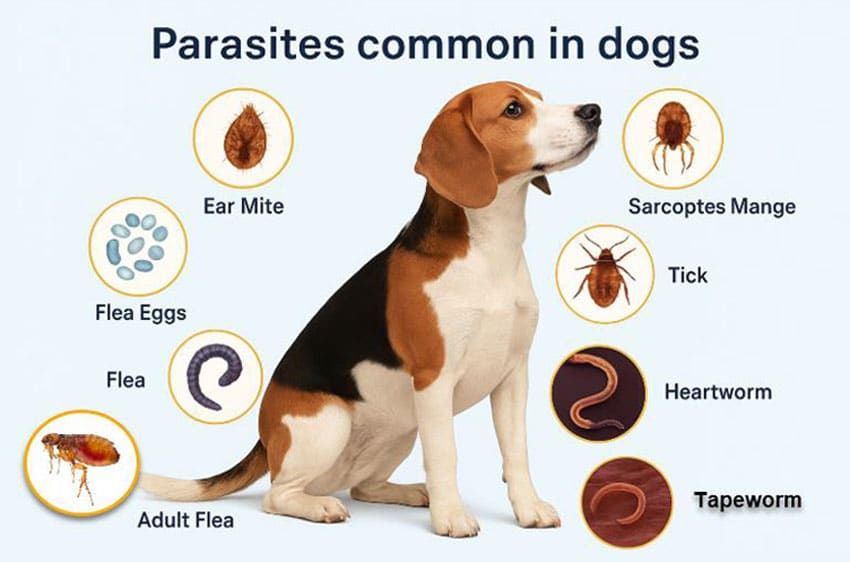Dog Parasites 101: What Every Pet Owner in Orange County Should Know
Top 3 Takeaways – Dog Parasites
Introduction
Parasites are one of the most common health threats to dogs in Southern California. From itchy fleas to potentially fatal heartworms, these organisms can live on your dog’s skin, inside their digestive system, and even in vital organs like the heart and lungs. Despite their small size, parasites can cause serious complications—including anemia, gastrointestinal issues, and life-threatening diseases—if left untreated. The good news is that most parasites are both preventable and treatable with regular veterinary care. At Bliss Animal Hospital, we work with dog owners every day to tailor parasite prevention plans based on lifestyle, age, and medical history. This blog covers everything you need to know to recognize the signs, understand how parasites spread, and keep your dog protected year-round.
Understanding the Types of Dog Parasites
Parasites in dogs fall into two main categories: external parasites (like fleas and ticks) and internal parasites (like roundworms or heartworms). Each type comes with its own health risks, symptoms, and treatment protocols. Understanding the difference is the first step to providing effective protection for your pet. Whether you have a high-energy pup who loves the outdoors or a senior dog who lounges at home, any dog can be exposed.
External Parasites (Ectoparasites)
External parasites are those that live on your dog’s skin or coat. They are often visible to the naked eye and may be the first sign something is wrong.
Even a brief walk through grass or a quick encounter at a dog park can be enough for these pests to hitch a ride.
Internal Parasites (Endoparasites)
Internal parasites live inside your dog’s organs or tissues, often within the digestive tract or cardiovascular system. Unlike fleas or ticks, these aren’t visible and often go undetected until symptoms appear.
Because internal parasites are harder to spot, regular screening is essential—even if your dog appears healthy.

Figure 1: Common Parasites in dogs
How Do Dogs Get Parasites in Orange County?
In Orange County’s temperate climate, parasites thrive year-round. Unlike colder climates where winter offers a natural reprieve, the consistent warmth and outdoor lifestyle here make our dogs more susceptible to exposure. Understanding where parasites come from—and how your dog might encounter them—is critical to prevention.
Dogs can contract parasites through various sources, often without their owners realizing it. Parks, hiking trails, beaches, and even backyard lawns may harbor parasite eggs or infected wildlife. Shared spaces like dog parks, boarding kennels, and daycare facilities can lead to cross-contamination, especially if proper sanitation protocols aren’t followed. Fleas and ticks may be lurking in grassy or wooded areas, while heartworm-infected mosquitoes can be active at dusk, even in urban neighborhoods.
Pet owners might assume indoor dogs are safe, but that’s not always the case. Parasites can enter your home on shoes, other pets, or be carried in through open doors and windows. That’s why we recommend every dog—regardless of lifestyle—stay on a comprehensive year-round prevention plan.
Symptoms of Parasites in Dogs
Recognizing the signs of a parasitic infection is not always easy. Some dogs show obvious symptoms like diarrhea or itching, while others may have silent infections that progress over time. In general, any sudden change in your dog’s appetite, weight, behavior, or appearance should prompt a veterinary exam.
Symptoms vary based on the type of parasite involved. External parasites like fleas and ticks are often easier to detect since they live on your dog’s skin and may cause visible irritation. Internal parasites, on the other hand, tend to present more subtly.
Here is a helpful summary:
| Parasite | Common Symptoms |
|---|---|
| Fleas | Excessive scratching, red skin, hair loss, flea dirt |
| Ticks | Visible engorged ticks, lethargy, lameness, joint swelling |
| Roundworms | Vomiting, diarrhea, bloated belly, poor growth in puppies |
| Hookworms | Bloody stool, anemia, pale gums, lethargy |
| Tapeworms | Scooting, visible white segment |
If your dog is showing any of these symptoms, it’s essential to seek veterinary care right away. Parasites rarely go away on their own—and the longer you wait, the more serious the condition can become.
How Are Dog Parasites Diagnosed?
Effective diagnosis is the cornerstone of parasite treatment and prevention. At Bliss Animal Hospital, we use a combination of diagnostic tools to detect parasites at different stages of infection. Early detection can mean the difference between a minor issue and a major health concern.
For intestinal parasites, we typically perform a fecal analysis using either flotation or antigen-based tests. These tests look for eggs, larvae, or proteins shed by parasites into your dog’s stool. Fecal tests are often recommended once or twice per year, especially if your dog frequents public areas.
For external parasites, diagnosis may involve a physical exam, skin scraping, or use of a flea comb to detect adult fleas and flea dirt. If a tick is found, we may test for tick-borne illnesses.
Heartworm disease is diagnosed through a simple blood test, usually included as part of your dog’s annual wellness exam. This test checks for proteins released by adult heartworms and can also be paired with a microfilariae test to detect immature worms in the bloodstream.
If we suspect parasites, we’ll discuss treatment options and recommend a tailored prevention plan moving forward.
Prevention Is the Best Cure
The most effective way to deal with parasites is to prevent them in the first place. Treatment is always possible, but prevention is safer, simpler, and far less costly in the long run. Fortunately, modern veterinary medicine offers a wide range of preventive options—many of which are safe, easy to administer, and effective against multiple parasites at once.
In Orange County, where fleas and mosquitoes can be active all year, we recommend a year-round prevention program. This may include:
Talk to your vet about the best plan for your dog. Factors like age, breed, health history, and environment all influence which products are best. At Bliss Animal Hospital, we also offer payment plans to make parasite prevention affordable and accessible for all pet owners in South Orange County.
Conclusion
Parasites may be small, but the problems they cause can be big. Left unchecked, fleas, ticks, worms, and other parasites can impact your dog’s comfort, wellbeing, and even their life expectancy. Luckily, modern veterinary care offers highly effective tools to diagnose, treat, and—most importantly—prevent these issues before they become serious.
Whether your dog is a couch potato or an outdoor adventurer, the team at Bliss Animal Hospital is here to help protect them from parasites year-round. With our affordable pricing, flexible payment plans, and tailored prevention programs, we’ll make sure your pup stays safe, healthy, and parasite-free.
Schedule online or call us at (949) 354-5201 to book your appointment today.
Veterinarian Services for Dog Parasite Prevention in Orange County, CA
Parasite prevention is one of the most important components of your dog’s year-round wellness plan. At Bliss Animal Hospital, we proudly serve families across South Orange County with personalized care and medically sound protocols to keep your pet protected from fleas, ticks, heartworms, and intestinal parasites.
Looking for trusted veterinary care in your area? Learn more about parasite prevention services at Bliss Animal Hospital near:
Meet Our Team
The blissfull faces behind the care
Driven by compassion and purpose, here is the team who will work to make a difference in your pet’s life. Every single visit.


What your neighbors are saying!
Areas we Serve at Bliss Animal Hospital:
“Better Care. Better medicine.” This is our motto, and our veterinary staff stands behind it.
Bliss Animal Hospital is conveniently located at the Home Depot Plaza in Foothill Ranch, less than a 10-minute drive from the neighborhoods of Lake Forest, Rancho Santa Margarita, Mission Viejo, and Irvine (Great Park and Portola Springs). We also serve more distant regions like Tustin, Coto de Caza, Las Flores, Ladera Ranch, Laguna Hills, Laguna Woods, Stonegate (Irvine), Woodbury (Irvine), and Cypress Village (Irvine).
Our vet hospital is ready to serve not only the communities of South Orange County but also anyone who truly believes that veterinary medicine starts with relationships.









Leave A Comment